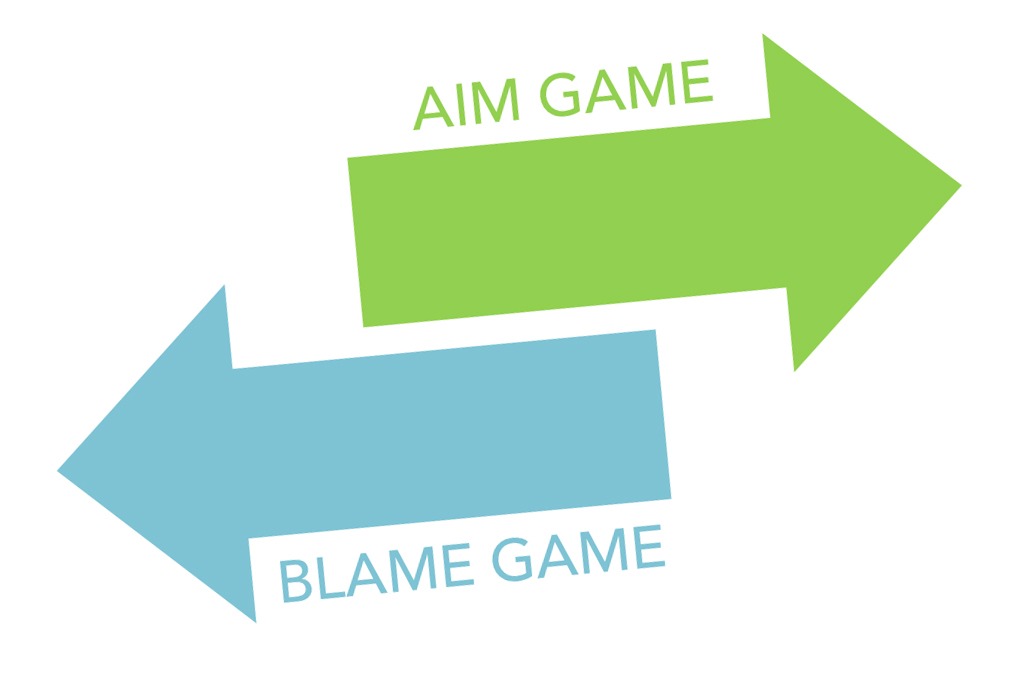Leadership, Productivity
Aim or Blame… What’s Your Leadership Game?
As an introvert, I normally don’t engage in much conversation with the people sitting next to me on planes. There was an exception to this rule on a recent flight to Atlanta, but I need to clarify one thing: It wasn’t really a conversation. The guy sitting next to me complaining about his job, boss, wife, kids, and dog, did most of the talking. I merely listened and added an occasional “There you go,” hoping he would stop talking.
I did get something out of the encounter, though. First, he helped reinforce my thoughts about taking responsibility for your life. Second, he gave me the idea for this blog.
So, what did I learn from this guy? Primarily, that he lives his life playing the Blame Game. Blame gamers always find someone or something to blame for their results or their place in life. This guy let me know:
- He would have been promoted if he had a better boss who valued his true gifts to the company
- He would be able to retire if he hadn’t had to pay for his children and their education
- He would have been able to find a better job if his industry wasn’t in a downturn
- He would have gone back to school and furthered his education, but he didn’t feel his company or boss valued a higher level of education
- He would have been able to move to a better place if his wife had been willing to move out of Nebraska and away from her family
- He would go on more vacations if they had someone to take care of their three dogs
When blame gamers find themselves in less-than-ideal situations, they ask two questions:
What’s wrong with this situation?
Who can I blame?
If you were to ask these Blame Gamers, “When you figure out what’s wrong with a situation and who’s to blame, what have you accomplished?” most of them would quickly respond with, “Nothing.” Though this is the most common answer, it isn’t a truthful one.
When you blame your results or situation on someone or something, you accomplish something really significant: You absolve yourself of any responsibility for changing your situation or your results. You rely on the person you are blaming to fix it for you.
Great leaders choose to play the Aim Game, rather than the Blame Game. Aim Gamers ask a very different set of questions when they encounter a less-than-ideal situation. They ask:
What’s our vision, or where do I/we want to be?
What actions do I/we need to take to get there?
Everyone is subject to play the Blame Game at times. Here are 5 tips on how to stop blaming others in order to help you follow the path of a great leader, increase positive thinking and stay committed to playing the Aim Game.
Admit your mistakes. Blame gamers love to defend what didn’t work. Aim gamers, on the other hand, are quick to take responsibility, even when they may not have been the one to actually make the mistake. When someone on their team drops the ball, they coach the individual so that the mistake doesn’t happen again. But, to everyone else, they say, “Things didn’t go as planned and I take full responsibility for making sure the situation is corrected and doesn’t happen again.” When you take responsibility and admit mistakes, others also feel more motivated to play the Aim Game and help you improve the situation and the outcome.
Hold others accountable for playing the Aim Game. When team members start to play the Blame Game, confidently ask them what they hope to accomplish by doing so. Most people will agree the Blame Game isn’t going to resolve anything. Then refocus the discussion around the Aim Game questions listed above.
Articulate a clear vision and goals of the desired outcome. When people have a clear vision and goals, and they know how their work supports the vision and goals. This makes it much easier to be accountable and motivated to play the Aim Game as well as increase positive thinking.
Enforce cross-departmental teamwork and communication. One of the significant differences between the leaders in our PBS Best of the Best Benchmark and the leaders in the PBS Overall Benchmark is that the Best of the Best leaders are rated significantly higher in the competency of promoting cross-departmental communication and teamwork. When team member don’t work well with each other or across departmental boundaries, there will be a ton of blame tossed between team members and departments. Hold team members accountable for communication that is direct, honest, and timely, and for teamwork that supports the organization.
Recognize and reward mistakes. When team members take initiative and try new ways of doing things, praise them for taking the initiative to try something new instead of blaming them for what didn’t work. Reward them for being willing to take a reasonable risk intended to improve the organization. When people don’t feel a need to defend their mistakes or an initiative that didn’t turn out as expected, they are much quicker to play the Aim Game, admit mistakes, and tell you what they are going to do differently to achieve the goal.
So, back to my seat neighbor on the flight to Atlanta. Two hours and a couple of glasses of wine into the flight, I had had enough of the Blame Game. When he started to blame his lack of vacations on the dogs, I said, “Hey, the whole world can’t be against you. Why don’t you take some responsibility for fixing what you don’t like about your life?” It was such a great question that it resulted in the last hour of my flight being spent in silence. Mission accomplished.











One Comment
Nancy
We always try to find the best solution and that means we let go of some options in order to choose a more desirable one. Then we want to have our cake and eat it too. It’s wonderful to go live in a new place and grow but at the cost of separating from friends and family. This option may or may not be a good one but we get used to what we’ve gained and only think about what we’ve lost. I think a lot of times, that’s the real issue. Usually things comes at a price and we either pay it because it’s worth it and we can afford it or we don’t. The decision is ours, we forget about it because we’re not mindful.